Aurelian Honor Society
Established in 1910, the Aurelian Honor Society ("Aurelian") is the fifth oldest landed secret society at Yale University in New Haven, Connecticut. It is a member of the Ancient Eight, which also includes Skull and Bones, Scroll and Key, and other "Sheff Societies" such as Book and Snake, Myth and Sword, and Berzelius.
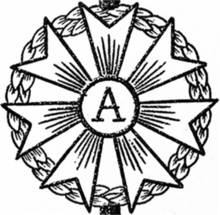 The logo of the Aurelian Honor Society | |
| Formation | 1910 |
|---|---|
| Type | Secret society |
| Headquarters | Yale University |
| Location | |
Region served | United States |
Official language | English |
Parent organization | Aurelian Honor Society Board of Trustees |
Founding mission
At the beginning of the 20th century, Yale University had two separate undergraduate colleges, each with separate facilities, administrations, and student bodies. One of these, the Sheffield Scientific School, suffered from student divisiveness due to an active Greek system that separated fraternities from each other, and those who were not in fraternities from those who were. In the spring of 1910, Lindell T. Bates and Loomis Havemeyer, recognizing the fragmentation of the student body and lack of unified leadership, founded the Aurelian Honor Society for seniors "who would not labor under unnecessary handicaps which separated the existing clubs from the student body".[1] Membership in this Society would be offered to outstanding "Sheff" students of good scholarship and extracurricular achievement. In addition, the Society was to elect three honorary members annually. The purpose of this non-secret organization was to formulate mature undergraduate opinion on those matters affecting the vital interests of the Sheffield Scientific School, both internally and in its relations with the rest of the University.[1]
Name and emblem
The name was chosen in honor of the Roman Emperor Marcus Aurelius, whose career and philosophy represented those ideas for which the organization wished to strive.
These ideals are symbolized by the Society's emblem: a seven-pointed star surrounded by a wreath. The wreath represents a reward of merit, and the star stands for a single body (originally seven members) radiating light in the seven principal lines of college activity—Scientific, Athletic, Literary, Oratorical, Executive, Scholarship, and Religious.
History
The Constitution of the society reads: "The object of this Society is to encourage and promote high character, gentlemanly conduct and the molding of one's career to a life to the community, and to bring the active members into contact with the honorary members who shall have been selected with the view that their careers shall be a source of inspiration".[1]
The first official meeting was held on June 6, 1910. The minutes from this meeting and subsequent meetings are collected in books in The Rooms, the Society's headquarters. At each meeting, a paper was read by a member on issues of undergraduate life. These papers have been collected and preserved by the Society's Historian and can now be found locked in a large safe that safeguards other treasures of the organization.[2]
Besides discussing issues of the University, Aurelian has, since its inception, overseen a variety of important philanthropic activities in support of the University:[3][4] a scholarship fund (in place since 1953 administered by the financial aid office), an undergraduate science contest, the Chester Harding Plimpton award ($100 in gold and the bas-relief medal, the original medal once hung on the wall in The Rooms), a public lecture series, and the prep-school cup award (predecessor to the present book awards). In 1935, the Society voted to give the University $250 to make a film of "Life at Yale" to be sent to alumni meetings throughout the country. The Society also enjoyed many social activities: supper parties in The Rooms, graduate teas after the big games in the fall, a luncheon on Class Day for graduates and their families and occasional theater and athletic events. It holds one of the largest endowments amongst societies at Yale. For many years, the New York alumni invited the Aurelian undergraduates to the Yale Club for a reception. In 2010, the Society hosted its 100th Anniversary at the Yale Club of New York.
After the unification of Yale College and the Sheffield Scientific School, and through the tumultuous era of the 1960s, the Aurelian Honor Society's role in University governance declined.[1] Nevertheless, Aurelian continued to be a supra-senior society, drawing its membership from throughout the University and other societies. Largely due to the sponsorship of Aurelian alumnus Loomis Havemeyer (author of the history of the Society, and whose photo hangs in the main room), Aurelian continued to meet for Tuesday lunches with faculty and honorary members. When Yale went co-ed, Aurelian followed suit, making it one of the few societies to do so at their first opportunity. In 1981, with the help of Dick Shank, then Registrar of Yale College and a successor of Loomis Havemeyer, Aurelian was revived after a period of a few years in the late 1970s when all societies and fraternities were in decline. In 2009, the current Delegation modified the constitution, officially declaring itself a Senior Society and thereby formally adopting the practices of those societies such as mutual exclusivity from other societies, conducting student biographies, and participating in the tap process. The Society still seeks to attract members from all walks of student life and maintains contact with the faculty. In this way, Aurelian still maintains the leadership role on which it was founded, emphasizing a sense of history and inquisitiveness. This legacy persists in its annual speakers program and monthly lunches with members of the faculty and administration. Past guests of the Society include Four Star American General Stanley A. McChrystal and American politician Howard Dean.
Yale University President Peter Salovey, Yale University Dean Marvin Chun, and Robert A. Lovett Professor of Military and Naval History John Lewis Gaddis are among the honorary members who make annual visits to the Aurelian delegation.
Philanthropy
Aurelian’s history has been defined by its history of service to Yale and to the broader community.
Today, The Aurelian Honor Society Robert H. O’Connor Scholarship is awarded each year to a Yale senior. The Aurelian Honor Society Book Prize is given annually at secondary schools across the country to students those schools consider exemplary. In addition, The Society supports a participating student at the Yale Summer Bioethics Institute through the Nuland Stipend. Most recently, Aurelian has associated itself with the Yale Alumni Non-Profit Alliance (YANA). Some delegations and many delegates have been active volunteers through Dwight Hall and other service organizations.
In 1953, Loomis Havemeyer and fellow Trustees established the Aurelian Honor Society, Inc. as a charitable foundation (501c3) to preserve and further the established principles of the Honor Society and, through stewardship of donated funds, provide a university scholarship, academic prizes in Yale’s name and support for the undergraduate society of the same name.
Membership
Contemporary membership is based on an election process coordinated by the incumbent delegation. Aurelian selects sixteen prominent members of the Junior class to join the Society annually. Editors of publications such as The Yale Herald, varsity athletics captains, and other student leaders are typically well represented among Aurelian's ranks.
Membership in Aurelian originally did not preclude membership in a senior society but rather supplemented it, bringing together the best people from various fields to promote the high ideals in service to the University. A quote from the Yale Daily News of April 29, 1933 read: "The Aurelian Honor Society aims to promote contact and communication between members, to exert an organized force for cooperation with the administration and helpfully to consider problems affecting the University." At the 25th anniversary of Aurelian, the president of Yale said that the Society had reached a foremost position at Yale through its years of unceasing work to help solve administrative, educational, and social problems. In recognition, the University gave Aurelian its own luxurious quarters when "The Rooms" were constructed in 1932.
As of the fall of 2017, Aurelian members are provided membership to the Elm City Club, which consists of the Quinnipiack Club and the Graduate Club. This includes exclusive access to The Rooms in the Quinnipiack Club, renovated and used by the society alone.
In addition, Aurelian is part of a four-society "Consortium" with Manuscript Society, Book and Snake and Berzelius. The societies invite each other to their major social events each year in their respective spaces, providing opportunities for inter-society interaction.
Notable alumni
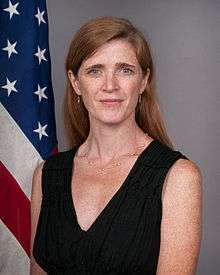
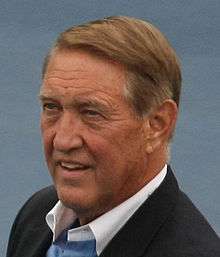
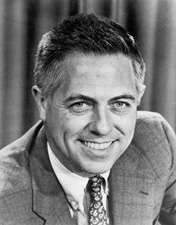
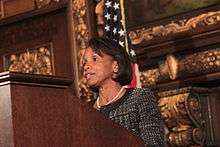
| Name | Yale Class | Known for |
|---|---|---|
| Loomis Havemayer | 1910 | Longstanding administrator of the Sheffield Scientific School at Yale University. Founding member and preeminent historian of the Aurelian Honor Society |
| James L. Buckley | 1944 | Inactive Senior United States Circuit Judge of the United States Court of Appeals for the District of Columbia Circuit. Former United States Senator from the state of New York |
| John B. Goodenough | 1944 | Solid-state physicist and professor of mechanical engineering and materials science at The University of Texas at Austin. Widely credited for the identification and development of the Li-ion rechargeable battery. |
| Richard Lyon | 1945 | The first Admiral of the United States Navy Special Warfare SEAL |
| James Stevenson | 1951 | Illustrator and author of over 100 children's books |
| Russell W. Meyer Jr. | 1954 | Chairman Emeritus and former Chief Executive Officer (CEO) of the Cessna Aircraft Company |
| Sam Chauncey | 1957 | Longtime administrator at Yale University |
| Larry Bensky | 1958 | Pacifica Radio station KPFA-FM in Berkeley, California |
| T. K. Seung | 1958 | Jesse H. Jones Professor in Liberal Arts, at the University of Texas at Austin |
| Donald Dell | 1960 | Attorney and former professional tennis player, U.S. Davis Cup captain, and member of the International Tennis Hall of Fame |
| Heinrich von Staden (historian) | 1961 | Author of Herophilus: The Art of Medicine in Early Alexandria |
| Lance Liebman | 1962 | Former Dean of Columbia Law School |
| Richard Portes | 1962 | CBE; professor of Economics at London Business School; Founder and President of the Centre for Economic Policy Research, Rhodes Scholar |
| Philip Proctor | 1962 | Member of The Firesign Theatre; Voiced Howard Deville in Rugrats and All Grown Up! |
| Warren Hoge | 1963 | Journalist at The New York Times |
| Robert G. Kaiser | 1964 | Former managing editor of The Washington Post |
| John Shattuck | 1965 | U.S. Ambassador to the Czech Republic 1998–2000; fourth President and Rector of Central European University (CEU) from August 2009 until July 31, 2016; senior fellow at the John F. Kennedy School of Government |
| Maury Yeston | 1967 | Wrote the music and lyrics to Nine (1982) and Titanic (1997) |
| Victor Ashe | 1967 | Former United States Ambassador to Poland; former mayor of Knoxville, Tennessee |
| Jorge I. Domínguez | 1967 | Antonio Madero Professor for the Study of Mexico at Harvard University and chair of the Harvard Academy for International and Area Studies |
| Mark L. Wolf | 1968 | Senior United States District Judge for the United States District Court for the District of Massachusetts |
| Thurston Clarke | 1968 | Author of JFK's Last Hundred Days: The Transformation of a Man and the Emergence of a Great President |
| Jacques Leslie | 1968 | War correspondent for the Los Angeles Times during the Vietnam war |
| Derek Shearer | 1968 | Former United States Ambassador to Finland |
| Jim Amoss | 1969 | Former editor of The Times-Picayune, winner of four Pulitzer Prizes |
| Myron Herbert Thompson | 1969 | Senior United States District Judge of the United States District Court for the Middle District of Alabama |
| Ted Landsmark | 1969 | President of Boston Architectural College (BAC) from 1997 to 2014 |
| Virginia R. Domínguez | 1971 | Edward William and Jane Marr Gutgsell Professor of Anthropology at the University of Illinois at Urbana-Champaign |
| James Lindgren | 1974 | Professor of law at Northwestern University |
| Susan R. Wolf | 1974 | Edna J. Koury Professor of Philosophy at the University of North Carolina at Chapel Hill |
| Reuben Jeffery III | 1975 | Former United States Under Secretary of State for Economic, Business, and Agricultural Affairs; President, Chief Executive Officer and member of the board of Rockefeller & Co. and Rockefeller Financial Services, Inc. |
| Wilhelmina Wright | 1986 | United States District Judge of the United States District Court for the District of Minnesota |
| Keith Ferrazzi | 1988 | Founder and CEO of Ferrazzi Greenlight, a Los Angeles, California-based research and consulting firm; wrote the New York Times best-selling books Never Eat Alone and Who's Got Your Back? |
| Samantha Power | 1992 | United States Ambassador to the United Nations from 2013 to 2017 |
| Nicholas de Monchaux | 1995 | Associate Professor of Architecture and Urban Design in the College of Environmental Design at the University of California, Berkeley |
| Charles Duhigg | 1997 | Author of The Power of Habit: Why We Do What We Do in Life and Business |
| R. David Edelman | 2007 | First Director for International Cyber Policy on the National Security Council; Director of the Project on Technology, the Economy, and National Security (TENS) at the Massachusetts Institute of Technology |
See also
- List of Yale University student organizations
- Collegiate secret societies in North America
References
- Loomis Havemeyer's The Aurelian Honor Society of Yale University and Its Times 1910–1955
- Measuring Yale's value in clubs and classes Archived October 24, 2011, at the Wayback Machine
- Valedictorian and Aurelian Speakers Selected Archived July 18, 2011, at the Wayback Machine
- "Taft's School Highest Academic Award". Archived from the original on 2011-01-07. Retrieved 2011-02-11.